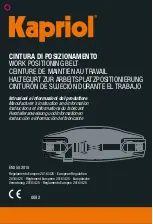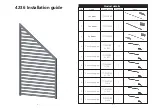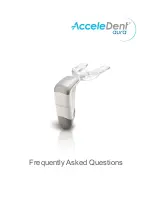
18 / 41
Hakki Pilke 35 Falcon
Translation
Version 10
If a fault occurs during the test run, determine the cause of the fault and take remedial action as deemed neces-
sary. The machine must be shut down and disconnected from the power source for the duration of both the diag-
nostics and repairs.
Note! When the temperature of the hydraulic oil is < 5°C, the machine must be allowed to idle until the oil
temperature rises to at least > 10 C° before starting operation.
Note! Do not leave a running machine unsupervised!
3.4.
Feeding and sawing wood
The in-feed conveyor feeds the wood to be processed into the machine. Feed wood into the machine using con-
trol lever D in Figure 11 of Section 3.1.
When feeding wood into the machine, make sure that it does not present a risk of your clothes, hands or other
parts getting caught in the machine, for example, due to the shape of the log. Do not use your hand to guide the
log into the cutting section. Adjust the wood measuring device to the desired length and make sure that the
speed of the out-feed conveyor belt is suitable by adjusting it.
1.
Choose the log to process. Note that the maximum log diameter is 35 cm. The knottiness and shape of
the log can increase the diameter.
2.
Use the in-feed conveyor to feed wood into the cutting section by pushing lever D in Section 3.1 (3.111)
to the upper right position. You can cancel the feed by pushing lever D to the upper left position.
3.
Once the log stops for cutting in the mechanical measuring device, lock the log in place with the wood
press by pressing handle C of the press (Figure 11) downward.
4.
Cut the log by pulling lever D back, which activates the saw chain and lowers the saw bar (Figure 11).
5.
Return the saw bar to the raised position by pushing lever D (Figure 11) forward,
which automatically ac-
tivates the splitting function
.
Note! You cannot use the machine to saw during the splitting motion of the splitting beam!
Sawing is allowed during the return motion of the splitting beam.
Placing logs on the in-feed conveyor
We recommend the use of auxiliary devices, such as the HakkiFeed 422 timber deck. If a timber deck is not at-
tached to the machine, the maximum allowed log length is 4.5 m. Always lift and place wood on the in-feed con-
veyor in a safe manner that does not put the operator in danger.
Note! Placing logs directly on the in-feed conveyor with a loader is strictly prohibited.
Note! Ensure that the log's centre of gravity stays on the conveyor.
Sawing the last log
When sawing wood, the second to last piece should be sawn in such a way that the remaining piece is of a suffi-
cient length. This ensures that the log will stay firmly under the log press and that the sawing will be steady and
safe. Drive the last piece of wood directly into the splitting section, and start the splitting process with control
lever A or lever E (Figure 11).
3.5.
Log splitting
The splitting beam performs the splitting motion automatically whenever the saw bar is lowered all the way down
using lever E (Figure 11) and raised back up again. In other words, the splitting motion starts automatically when
the log is dropped into the splitting groove after cutting and the saw bar is lifted back up.
In addition to this, control lever A (Figure 11) can be used to activate the splitting by pushing the lever briskly to
the right and returning it to the initial position. This function is useful, for example, when the last log to be split
















































